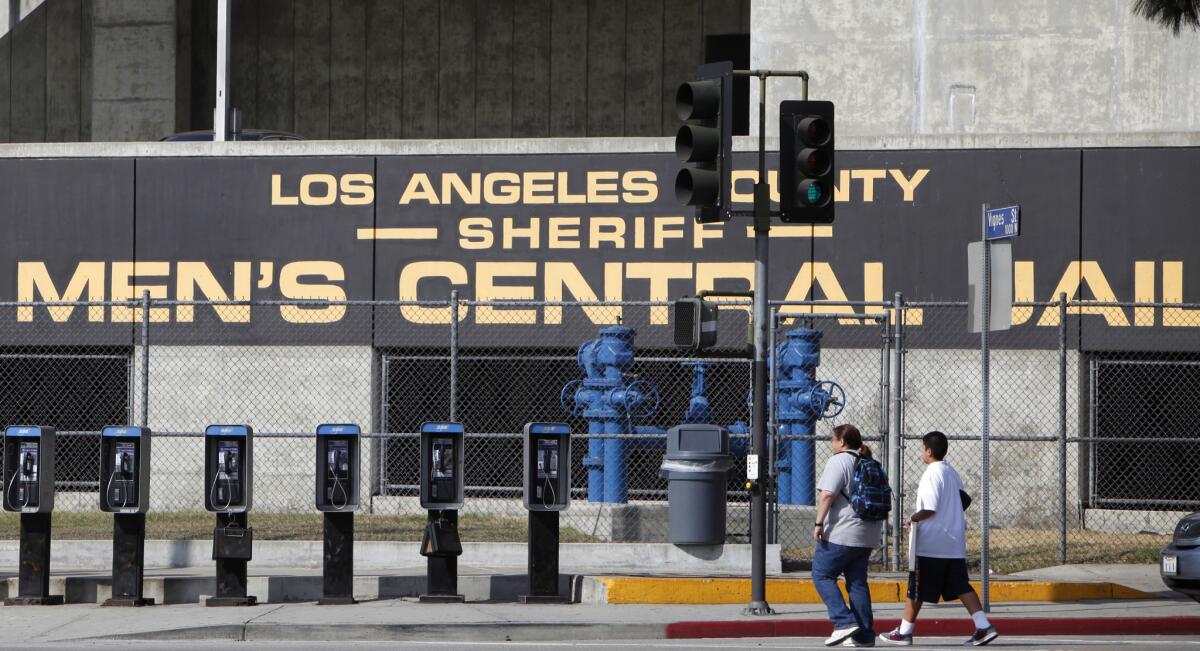Note to L.A. Sheriff’s Dept.: Handcuffing diplomats is a no-no

- Share via
What does it take to provoke a Los Angeles County sheriff’s deputy to slap handcuffs on you? For a female Austrian diplomat, all it took was asking to see a supervisor at the Men’s Central Jail.
That’s according to one of the federal indictments unsealed Monday in Los Angeles. Granted, the indictments tell only one side of the story. But it’s still astounding that a diplomat (and a female one at that) making a routine visit to the jail would end up in restraints.
I mean, who hasn’t heard of diplomatic immunity?
SOCAL POLITICS IN 2013: Some rose, some fell -- and L.A. lost its women, almost
According to the indictment, the unnamed consul (who has since moved to another posting) went to the jail in June 2011 with her husband to visit an inmate who was an Austrian citizen. The indictment alleges that Sussie Ayala, a deputy sheriff at the jail, detained the husband outside the jail because he had “walked near the doors going into the [jail’s] visiting center.”
His actions did not amount to a crime, the indictment asserts. Nevertheless, Ayala handcuffed him, the indictment alleges, which prompted the consul to ask to see a supervisor. She was then arrested and handcuffed too, the indictment alleges, “despite the fact that [she] had committed no crime and would be immune from prosecution if she had.”
Let’s assume just for the sake of argument that the consul and her husband weren’t the most cooperative and docile of jail visitors. Assume they were argumentative and demanding, or maybe even condescending. Regardless, U.S. law treats diplomats as special people with special privileges -- as do the laws in the rest of the civilized world.
YEAR IN REVIEW: Ted Rall’s five best cartoons of 2013
The problem here, according to the Justice Department, is that some in the Sheriff’s Department considered themselves in an even higher league of special. As Andre Birotte Jr., the U.S. attorney in Los Angeles, put it in a statement: “The pattern of activity alleged in the obstruction-of-justice case shows how some members of the Sheriff’s Department considered themselves to be above the law.”
The indictment accuses Ayala of taking the consul and her husband to a deputy break room that’s outside of public view and caused the consul to be searched -- and not because she was suspected of being armed or having committed a crime.
But as demeaning as a search can be, it’s positively kind in comparison to the beat-downs that the indicted deputies allegedly issued to other jail visitors.
Again, that’s just the prosecutors’ side of the story, and it’s designed to put the accused in the worst possible light. For what it’s worth, Andreas Lins, a consul at the Austrian Consulate General in Los Angeles, said: “We think that the indictment is quite an accurate factual statement of what happened. There are no other things out there which should be addressed.”
ALSO:
The saddest Christmas wish lists ever
Are America’s students falling behind the world?
Follow Jon Healey on Twitter @jcahealey and Google+
More to Read
A cure for the common opinion
Get thought-provoking perspectives with our weekly newsletter.
You may occasionally receive promotional content from the Los Angeles Times.







